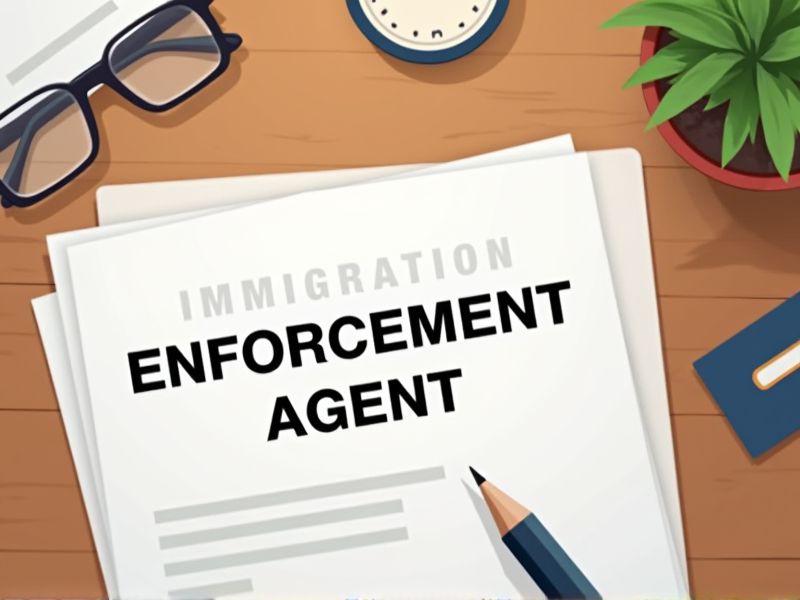
Becoming an Immigration Enforcement Agent requires a thorough understanding of legal frameworks surrounding immigration law and border security. Certifications often validate the necessary skills, such as firearms handling, self-defense techniques, and law enforcement protocols. They also ensure agents maintain a standard of ethical conduct and demonstrate competencies critical to national security. Important certifications for an Immigration Enforcement Agent include those listed here.
ICE Basic Agent Training Certification
ICE Basic Agent Training Certification is a requirement for Immigration Enforcement Agents because it equips them with essential skills and knowledge for effective law enforcement operations. Without this certification, agents may lack the necessary legal understanding and procedural training to handle immigration cases appropriately, leading to potential legal issues. The certification ensures that agents are up-to-date with current regulations and enforcement techniques, enhancing their capability to uphold national security. It also promotes standardization across the force, which leads to more coordinated and efficient operations in handling immigration enforcement tasks.
Border Security Operations Certification
Border Security Operations Certification equips Immigration Enforcement Agents with vital skills in surveillance and tactical response, enhancing their operational effectiveness. The certification ensures agents are well-versed in the latest immigration laws and regulations, promoting lawful and ethical enforcement practices. Proper training through certification reduces the likelihood of procedural errors, safeguarding against legal complications and human rights violations. This certification strengthens inter-agency collaboration by standardizing knowledge and practices among border security personnel.
Advanced Tactical Training Certification
Receiving an Advanced Tactical Training Certification equips Immigration Enforcement Agents with necessary skills to handle high-intensity situations, thereby enhancing the safety of both agents and the public. This certification ensures agents are proficient in the latest techniques, which is critical in adapting to evolving threats within immigration enforcement operations. By being trained in advanced tactics, agents can make informed and strategic decisions in dynamic environments, reducing errors and improving operational outcomes. This type of training fosters increased confidence in agents, which can improve overall morale and effectiveness in executing their duties.
Criminal Investigations Certification
Criminal Investigations Certification provides immigration enforcement agents with the necessary skills to identify and analyze deceptive practices used in unlawful immigration activities. By equipping agents with advanced investigative techniques, the certification enhances their effectiveness in uncovering illegal operations and collaborations. This expertise aids in the accurate assessment and processing of cases, ensuring a more efficient enforcement procedure. Enhanced investigative capabilities help mitigate legal risks and uphold the integrity of immigration policies.
Defensive Tactics and Firearms Certification
Defensive tactics are crucial for immigration enforcement agents because they often encounter unpredictable and potentially hostile situations, necessitating the ability to protect themselves and others effectively. Certification in firearms is required to ensure agents are competent and responsible in using such weapons, reducing the risk of accidental harm. Proficiency in these areas enhances the safety of both the agents and the individuals they interact with during enforcement operations. Proper training and certification can increase public trust in immigration enforcement agencies by demonstrating a commitment to professionalism and safety.
Crisis Intervention and De-escalation Certification
Crisis Intervention and De-escalation Certification equips Immigration Enforcement Agents with skills to effectively manage tense and potentially volatile situations, reducing the risk of harm to all parties involved. Training in these areas enhances communication strategies, enabling agents to peacefully resolve conflicts that might otherwise escalate. Cultural competence gained through this certification aids agents in understanding diverse backgrounds, which is vital in immigration contexts. Certified agents are better prepared to uphold safety, legality, and ethical standards during enforcement operations.
Emergency Medical Response/First Aid Certification
Immigration Enforcement Agents often encounter situations where individuals sustain injuries, necessitating quick medical intervention to stabilize them. Certification in Emergency Medical Response equips agents with the skills to provide immediate first aid, potentially saving lives before professional medical help arrives. The nature of their work involves high-risk operations where safety risks are prevalent, making such training crucial for effective on-the-ground management. Beyond immediate care, possessing this certification enhances an agent's ability to assess and manage crisis situations efficiently.
Immigration Law and Policy Certification
Understanding Immigration Law and Policy is crucial for an Enforcement Agent because it ensures compliance with legal standards and human rights. Comprehensive certification helps agents distinguish between lawful and unlawful immigration activities, reducing errors and legal challenges. It equips agents with the necessary skills to navigate complex immigration scenarios and improves decision-making in dynamic environments. Enhanced knowledge from certification fosters community trust and cooperation by ensuring fair and consistent enforcement practices.
Counterterrorism and Intelligence Analysis Certification
Certification in Counterterrorism and Intelligence Analysis equips Immigration Enforcement Agents with the skills to identify potential security threats, thus increasing national safety. This training allows agents to better analyze and interpret intelligence data, leading to more informed decision-making. Enhanced analytical skills improve agents' ability to differentiate between threats and non-threats, streamlining operations. Certification also ensures that agents are up to date on the latest counterterrorism strategies and technologies, maintaining efficiency and effectiveness.
Cybersecurity Awareness for Law Enforcement Certification
Increasing cyber threats target both public and national security, making cybersecurity awareness essential for Immigration Enforcement Agents. Certification equips agents with skills to protect sensitive immigration data from breaches. Cyber attacks could compromise personal information, harming both individuals and overall immigration processes. Awareness training enables agents to identify and mitigate cyber risks, ensuring better law enforcement outcomes.
Summary
As a reader, when you pursue certifications as an Immigration Enforcement Agent, you'll likely enhance your professional skills and knowledge. This professional development often leads to increased competency and efficiency in handling immigration-related tasks. Skills gained from certifications may improve operational performance and result in better decision-making abilities in complex situations. Enhanced credentials can lead to career advancement opportunities, including promotions and specialized roles.
